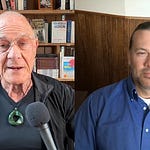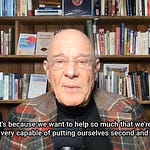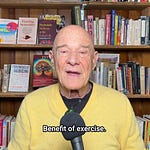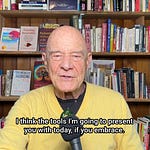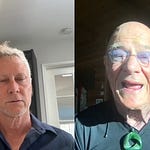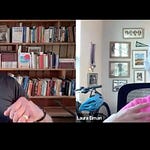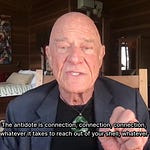Dear Listener,
Last Friday, I found myself in an unexpected situation. After experiencing a prolonged tachycardia with a heart rate of 134 beats per minute, I sought medical attention at a local emergency room. The doctors decided to perform a cardioversion, a procedure that involves applying electrical stimulation to the heart to restore its normal rhythm. As they prepared to administer anesthesia, I requested ketamine instead of the usual fentanyl. To my surprise and delight, the doctor agreed, and I embarked on a psychedelic journey that left me once again pondering the nature of consciousness and the therapeutic potential of these extraordinary substances.
This experience served as a reminder of the complex and often paradoxical world of psychedelic medicine, a topic I had the privilege of discussing with the legendary Professor David Nutt in a recent episode of the podcast. Professor Nutt, a renowned expert in the field and author of the groundbreaking book Psychedelics: The Revolutionary Drugs That Could Change Your Life – A Guide from the Expert, offered invaluable insights into the history, science, and future of these compounds.
The War on Psychedelics: A Tale of Politics, Fear, and Misinformation
As Professor Nutt eloquently stated, "LSD was the first and only drug ready to be banned because it changed the way people voted and the way people thought about international politics."
The connection between psychedelics and the anti-Vietnam War protests of the 1960s cannot be overstated. These substances played a significant role in shaping the counterculture movement and influencing the political views of a generation.
The US government, threatened by the potential of psychedelics to undermine the status quo, responded with a swift and ruthless campaign of suppression. As Professor Nutt explained, "It is truly the most horrific imposition of a particular political will on research there's ever been. Let's be honest, it's still there. These drugs are still illegal in your country, in my country, in fact, they're illegal in every country in the world, with the exception of a couple of Latin American countries where the natural product equivalents are available."
This suppression was fueled, in part, by the false narrative that psychedelics were highly addictive substances. Professor Nutt addressed this misconception head-on: "That was exactly the opposite. That was just a falsehood, which was put into the UN conventions, put into your drugs act, put into our drugs act by people who knew they were lying. And we've got 55 years of denial of access. It's very, of all the, you know, millions of people probably would have benefited if they just, it could have kept them as medicines, but they, they were so, the government was so terrified and so hateful that they, they even took them out of medicine because of the recreational use."
The Paradoxical Effects of Psychedelics on Mental Health
The world of psychedelic research is fraught with paradoxes and challenges, as evidenced by the difficulties in studying ayahuasca, a potent brew containing DMT and an MAO inhibitor. Professor Nutt shed light on this issue, explaining that "it's almost impossible to get ethical permission to give two different drugs because ayahuasca is a combination of two drugs. And on top of that, there are two drugs which come from plant products. So actually gauging the amount of each in an ayahuasca drink is very difficult."
Despite these hurdles, the potential therapeutic benefits of ayahuasca cannot be ignored. As Nutt suggested, "it's plausible that ayahuasca would be even maybe even more powerful than what we're doing with psilocybin."
Another fascinating paradox emerges when considering the effects of psychedelics on obsessive-compulsive disorder (OCD). In our discussion, Professor Nutt revealed that even at sub-psychedelic doses, these substances can help individuals with OCD by "breaking down that enormous resistance that is dominating their lives." He explained that "people with OCD spend their whole life working out how not to do things, and psychedelics began to break that down and made them, at the very least, see that they could be different." This concept of positive disintegration, whereby the breakdown of rigid patterns leads to growth and healing, is particularly relevant in the context of OCD treatment.
The Ketamine Conundrum: Balancing Therapeutic Potential with Addiction Risks
Ketamine, while not a classic psychedelic, has garnered significant attention for its rapid antidepressant effects. However, as Professor Nutt cautioned, "the big downside of ketamine is that it's kind of more liked, it's more addictive." He elaborated on the risks, stating that "if you're using a lot of ketamine, you know, grams a day for weeks or months, you can end up basically destroying the epithelial lining of your bladder and getting terrible cystitis, which can lead to you needing to have the bladder removed, which is obviously a really very major and unpleasant operation."
This stands in stark contrast to the anti-addictive properties of classic psychedelics like psilocybin and LSD. I've been practicing for over 60 years, and I've never run into one case of a person dependent on LSD or psilocybin.
Not one case in 60 years.
Professor Nutt echoed this sentiment, emphasizing that "psychedelics are anti-dependence. And that is another fascinating difference, which we don't understand."
The ketamine conundrum highlights the need for responsible use and administration in clinical settings. While its therapeutic potential is undeniable, particularly in cases where classic psychedelics may be less effective, the risks associated with ketamine use cannot be overlooked. As Professor Nutt stated, "it's generally thought that psilocybin is more powerful and more enduring, but then on the other hand, ketamine is legal because it's a medicine for anesthesia."
I recommend that you purchase a copy of Professor Nutt's book, Psychedelics, and tune into his Drug Science Podcast, for a deeper dive into the fascinating world of psychedelic research. And, of course, be sure to listen to our full conversation, where we explore these topics in even greater detail.
Golden light,
Dr. Richard Louis Miller
Links
Official website of David Nutt, a psychiatrist specializing in the effects of drugs on the brain: https://www.davidnutt.com/
Official page for the book Psychedelics: The Revolutionary Drugs That Could Change Your Life – A Guide from the Expert by David Nutt
David Nutt's Twitter handle for updates and discussions on his work: @profdavidnutt
Listen to Learn
Contribution of Professor David Nutt to our understanding of psychedelics and their clinical applications
Factors leading to the prohibition and vilification of psychedelics in the United States
Impact of the suppression of psychedelic research on scientific progress in the field
Potential benefits of using psychedelics as a treatment for mental health conditions
Role of spirituality in the current understanding and use of psychedelics
Use of psychedelics to address addiction, such as heroin addiction
Importance of reframing attitudes and lifestyles when treating substance use disorders
Contribution of psychedelics to personal transformation and healing beyond simply stopping substance use
My Books
Freeing Sexuality: Psychologists, Consent Teachers, Polyamory Experts, and Sex Workers Speak Out
Psychedelic Wisdom: The Astonishing Rewards of Mind-Altering Substances
Psychedelic Medicine: The Healing Powers of LSD, MDMA, Psilocybin, and Ayahuasca
Integral Psychedelic Therapy (co-edited with Jason A. Butler & Genesee Herzberg)





